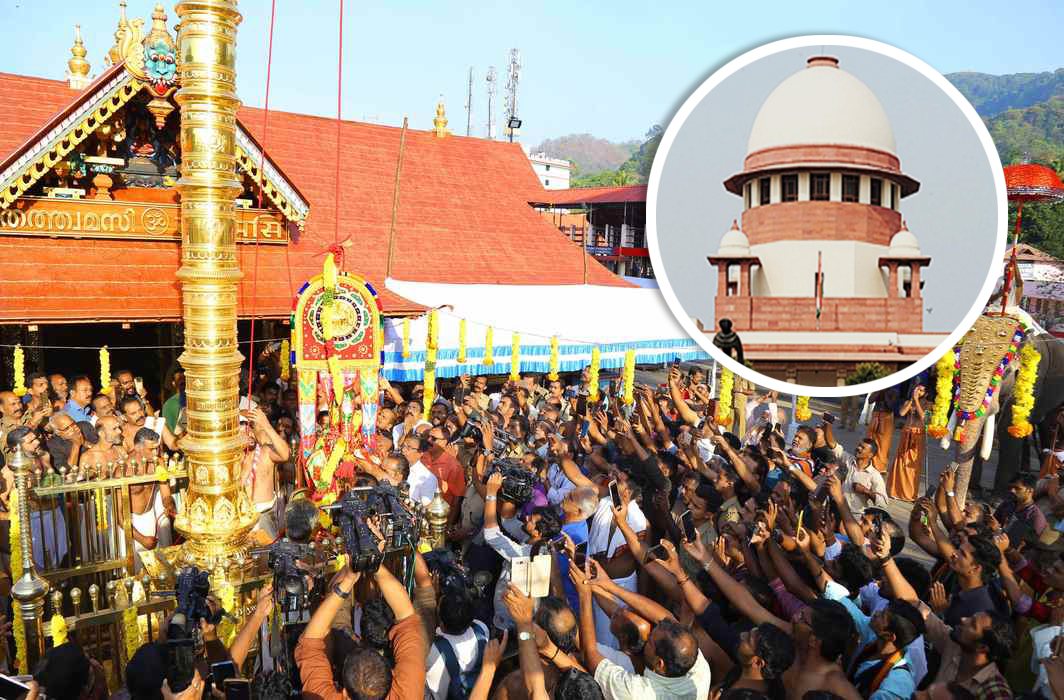The Supreme Court on Monday upheld the verdict of the five-judge bench in the Sabarimala case to refer to larger bench questions of law while exercising its limited power under review jurisdiction.
A nine-judge bench headed by Chief Justice S A Bobde framed seven questions to be heard by it on the larger questions of law on the ambit and scope of religious freedom practised across the country.
The court said it will hear the seven issues on a day-to-day basis from February 17.
The following seven issues will be heard by the nine-judge bench:
1. What is the scope and ambit of right to freedom of religion under Article 25 of the Constitution of India?
2. What is the interplay between the individual rights granted under Article 25 of the Constitution of India and rights of religious denomination under Article 26 of the Constitution of India?
3. Whether the rights of a religious denomination under Article 26 of the Constitution of India are subject to other provisions of Part III of the Constitution of India apart from public order, morality and health?
4. What is the scope and extent of the word ‘morality’ under Articles 25 and 26 of the Constitution of India and whether it is meant to include Constitutional morality?
5. What is the scope and extent of judicial review with regard to religious practice as referred to in Article 25 of the Constitution of India?
6. What is the meaning of expression “Sections of Hindus” occurring in Article 25 (2) (b) of the Constitution of India?
7. Whether a person not belonging to a religious denomination or religious group can question a practice of that religious denomination or religious group by filing a PIL?
On November 14 last year, a five-judge bench led by then Chief Justice Ranjan Gogoi, by a 3-2 majority decision, had not passed any verdict in the Sabarimala review cases and instead, gone on frame larger questions relating to religious practices among various faiths in the country.
The court had also decided to hear pending cases, including bar on entry of Muslim women into mosques, Parsi women married to non-Parsi into the fireplace of an agiary and female genital mutilation among Dawoodi Bohra community.
The five-judge bench had heard petitions seeking review of the court’s September 28, 2018 verdict, which had held that the centuries-old prohibition on entry of women of menstruating age into the Sabarimala temple as unconstitutional and discriminatory.
The prohibition stemmed from the belief that Lord Ayyappa of the Sabarimala temple has vowed celibacy and therefore, women between the age of 10 and 50 years had been prevented from entering the shrine.
During today’s proceedings, the court asked the lawyers who appeared in the case to provide information about the parties they were representing and said it will then decide on the allocation of time for arguments to them.
Solicitor General Tushar Mehta, representing the Centre, would open the arguments followed by senior advocate K Parasaran on February 17, the nine-judge bench also comprising Justices R Banumathi, Ashok Bhushan, L Nageswara Rao, M M Shantanagoudar, S A Nazeer, R Subhash Reddy, B R Gavai and Surya Kant said.
The bench made it clear that none of the major parties would get more than a day to argue with two hours each for rejoinder.
Last week, the court had reserved its verdict on whether it could refer questions of law to a larger bench in a review petition.
Senior advocate Indira Jaising had told the bench that the court may refer the questions even at the review stage, but added that the scope of the hearing would be different.
Countering the argument, senior counsel Rajeev Dhavan had said a review lay only when the court found that there was an error on record, but no error had been pointed out in the main judgment in the Sabarimala case.
Senior advocate Jaideep Gupta, appearing for the Kerala government, had argued that the review bench could not have made the November 14 reference to a larger bench before completing its assigned task.
Intervening in the case, senior lawyer Fali Nariman had agreed with the state government, saying, “When a review petition is pending, the idea is to hear it.”
He had contended that the court could not declare law in thin air.
However, Parasaran had said the Supreme Court, which the highest court of the country, has unlimited jurisdiction.
Assembling for the first time on January 13, the nine-judge had asked the counsels to meet and frame the questions for the hearing.
However, the counsels, in a conference held on January 17, could not arrive at a consensus regarding the framing of the issues.
Disappointed by the lack of agreement, the court had said it will frame the questions itself after deciding the preliminary issue of maintainability of reference.
On February six, the court had reserved its order of the issue of framing questions.


